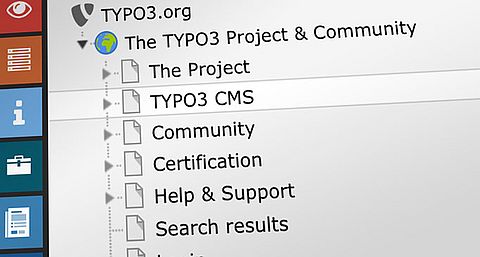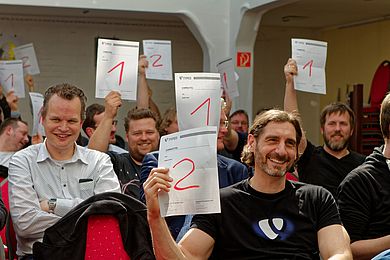For this years Summer of Code 152 Free and Open Source Software (FOSS) organizations were accepted. The TYPO3 community is proud to be among that list of organizations which reads like the who-is-who of the Open Source movement.
Google Summer of Code announcements
The announcement of accepted organizations was followed by the student application phase were interested students went to apply to work with the orgs during the summer. The students accepted into Google Summer of code were announced on Monday, overall 1025 student made it, congratulations to all of you! Each org was given a certain number of student slots, TYPO3 got 5 slots assigned, one more than last year.
This year Google sponsors each student with a stipend of 5,000 USD and an additional 500 USD per student for the TYPO3 Association. With 5 accepted students this adds up to an 27,500 USD investment in TYPO3 summing up in a total investment in TYPO3 through the Google Summer of Code program of 49,500 USD (including last year's 4 students). We appreciate that confidence a lot!
During that applications phase our mentors reviewed all the student applications and rated them on different criteria. Things we usually look for include the overall appearance of the application, a well planned schedule of what deliverable would be available when, comprehensive analysis of a problem and possible solutions to them, targets not set too high and manageable during the 3 months coding period. Other key factors include previous activity in the community, familiarity with TYPO3, bringing in own ideas.
Student applications
This year we got 30 student applications, down from 50 last year. In fact this is a good number as we learned a lot from last years Summer of Code. This year we asked students to fill out a more detailed and more "demanding" application template as compared to last year. Overall this led to better quality applications as more work needed to be put in. There was even a bonus point on the application this year which asked the students to pick an issue from the bug tracker and solve it. One student actually did this without having worked with TYPO3 before. We also found more students getting involved with the community, trying out TYPO3 by setting it up, and playing with it prior or during the application phase, even without being able to guarantee them to be accepted into GSoC 2010, this is great!
Some numbers
Two of the students joining us this year are working on FLOW3 / TYPO3 Phoenix, 3 are working on TYPO3 v4 related topics. We have one student returning after participating in GSoC last year already, while 4 are new to GSoC with TYPO3, one participated in GSoC with another organization before. We have three students who are new to TYPO3, two know TYPO3 already. Two students are from Asia (India and Sri Lanka), three are from Europe (Poland and Germany). After we were able to welcome Susanne Moog as the first woman in the core team not too far ago we are now also happy to welcome the first woman among our GSoC students this year.
Google Summer of Code 2010, TYPO3 Projects
Enhancing usability of the List Module
Student: Nuwan Sameera Hettiarachchi, from Sri Lanka
Mentors: Thomas Hempel and Tobias Liebig
Nuwan actually picked a quite ambitious project. He also submitted his application relatively late so that it nearly slipped through without being reviewed. In the end we did review each application though and stumbled over Nuwan's excellent application even with mock-ups and good ideas how to improve the list module. His experience in GSoC with another org and good references helped to accept him, too. Also a novelty for us is that two mentors are taking care of one project.
A generic i18n and l10n strategy for FLOW3 and TYPO3 Phoenix
Student: Karol Gusak, from Poland
Mentor: Karsten Dambekalns
Karol submitted a really extensive application showing he did some research on the topic. This is important as i18n and l10n are truely complex topics, TYPO3's support for multiple languages also has proven as a key factor to its success. Citing Karsten: "He approached us out of his own initiative before the program had 'officially started' and proposed a selection of possible projects, on which he had already done a fair amount of research. The further refinement of his proposal showed enthusiasm and attention to detail. Some of the problems identified in the proposal have not even occurred to me so far."
Enhancing the Media Content Element
Student: Aishwarya MB, from Sri Lanka
Mentor: Steffen Kamper
The media content element has always been a weak spot in TYPO3's content types so we're happy that Aishwarya is willing to improve it. She got in touch with the community early in the application phase on the dev list and on the GSoC list. As Steffen had worked on the media content element for TYPO3 4.3 before he of course offered to be her mentor. Aishwarya's experience with developing a video wrapper for the Codeigniter framework should also be helpful to her.
Modular Community System
Student: Pascal Jungblut, from Germany
Mentor: Ingo Renner
Another long time weak spot in TYPO3's eco system is getting some attention from Pascal this year. After having seen some attempts of creating a community system before we still don't have a truely good and usable solution. The outcome of this project will also benefit typo3.org, with the relaunch under way and also due this year, making the TYPO3 community more visible and providing new tools to communicate and collaborate on all kinds of projects.
Private resource handling for FLOW3 / TYPO3 Phoenix
Student: Andreas Förthner, from Germany
Mentor: Robert Lemke
Being an active community memember, member of the FLOW3 core team, and having successfully participated in GSoC last year made it an easy decision to accept Andreas again. This year he is going to implement private resource handling for FLOW3 / TYPO3 Phoenix. For TYPO3 Phoenix or 5.0 this means getting another big step closer to a usable product and improved security. For the midterm evaluation Andreas plans to have secure downloads in place and by the end of the Summer of Code he hopes to have support for CDNs.
Other student's applications
It was hard for us to pick those students from a couple more very good applications. In the end we only had 5 slots assigned and had to make some decisions. There are some more students we are going to contact to ask them whether they still would like to work on TYPO3 during the summer. We will make sure to find mentors for those projects as well, but can't provide any compensations like the officially accepted students receive.
Other students who also submitted applications but didn't get accepted can contact us to get information about why they weren't accepted to improve their application for a next try next year.
What's next
Next up is the so called community bonding period. That means that students try to get more familiar with their projects, available documentation, and also the community. Mentors will help the students with their first steps in TYPO3 and getting everything set up to speed before the actual coding starts May 24th.
Google Summer of Code 2010 is on!
Please welcome all Google Summer of Code 2010 students to our community and help them wherever possible. We're looking forward to a summer of great projects and coding! Good luck!




